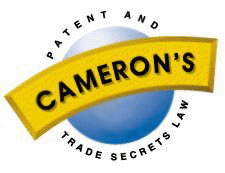
Case Comment
Domco Industries Limited v.
Mannington Mills Inc. and Congoleum Corporation
citation(s): (1990), 29 C.P.R. (3d) 481 (F.C.A. per Iacobucci C.J.)
 Case Comment |
Domco Industries Limited v.
|
copyright 1997 Donald M. Cameron, Aird & Berlis
"Vending" has the same meaning as "Selling". Although the phrase "in Canada" does not appear in s. 46, it is a necessary implication of the territorial limit of Canadian legislation. The term "F.O.B." has important legal and economic consequences. Where vending takes place is determined by: where delivery of the goods takes place; where the contract of sale takes place. The documents seem to suggest that the contracts were ultimately accepted and therefore effected in New Jersey. It was not established that the contracts of sale were made in Canada. The warranties given to customers by Domco in no way involved a sale or vending in Canada by Mannigton: it refers to what is being sold, not where the item is being sold.
A contract to deliver abroad, goods manufactured abroad, regardless of where the contract is made, does not in any way interfere with the patentee's right to work and use his invention within the jurisdiction. The floor coverings were delivered abroad in New Jersey and brought to Canada by others and subsequently resold here. Mannington made "paper offers" without possession in Canada of the patented goods. This does not amount to vending. The threshold question of venue is not helpful in defining "vending".
Where delivery or possession of the goods takes place outside of Canada, and where it is not proved that a contract for sale of infringing goods has taken place in Canada, no vending occurs in Canada for the purposes of section 46 of the Patent Act.
Return to:
Cameron's IT Law: Home Page; Index
Cameron's Canadian Patent & Trade Secrets Law: Home Page; Index